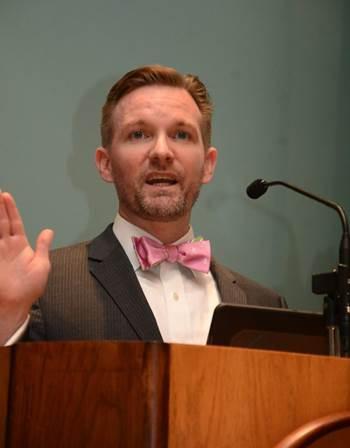
Naples Daily News: ‘Democracy in crisis’: Paul Ryan speaks in ‘Progressive Voices’ lecture series
No, he was not THAT Paul Ryan. As he was quick to point out, the Paul S. Ryan who spoke at the Unitarian Universalist chapel on Feb. 10 is not the newly-anointed speaker of the House of Representatives, nor a Congressman from Wisconsin.
This Paul Ryan might agree with "the other Paul Ryan" that our country faces problems, but his solutions would be entirely different. Ryan was the first of six scheduled weekly speakers in the local Progressive Voices lecture series held each year at the Unitarian church.
"To put it bluntly, our democracy is in crisis," Ryan, deputy executive director of the Campaign Legal Center in Washington, led off his talk. Elections, he said, are bought by those with the money to do so, and voter suppression has been ratified by the U.S. Supreme Court. The problem is not new, but it is growing worse and has reached an acute stage.
"In 1968, literally, bags of cash were delivered to Nixon campaign headquarters. Watergate at its heart was a campaign finance scandal," said Ryan. "In 2013, in Shelby County v. Holder, by a 5 to 4 vote, the Supreme Court finished dismantling the protections of the Voters Rights Act" that was passed in 1965.
Ryan is himself an attorney admitted to practice before the U.S. Supreme Court, but he told the audience — less than one week before the death of Justice Antonin Scalia — that in the prevailing climate, lawyers working for campaign finance reform go to great lengths to avoid taking a case to SCOTUS.
"Black voters are three times more likely to be disallowed, and Hispanic voters are two times more likely to be disallowed than white voters," said Ryan. Concurrently with establishing a requirement to show a government-approved ID to vote, the state of Alabama closed 31 Department of Motor Vehicles offices, every one in a county where minorities are the majority.
Another tactic to render elections unfair, said Ryan, is "gerrymandering," creating preposterously shaped districts designed to predetermine the outcome of elections, a topic that has been in the news recently for Florida voters.
"This is what happens when legislators choose their voters, instead of the voters choosing their legislators," said Ryan, showing a slide with twisted, serpentine voting districts drawn to concentrate minorities or members of one party into a few districts, so those making the districts are able to retain effective majorities in the legislative body.
Ryan and his Campaign Legal Center devote their lives to attempting to make election law fair, and to see that existing law is upheld, but as he made clear, calling it an uphill fight would be a gross understatement. Since the Supreme Court's "Citizens United" decision, opening the floodgates to unlimited cash, there is little to dissuade incumbents, candidates and donors from gaming the system however they see fit, and what laws are on the books are routinely ignored. With three Republicans and three Democrats, he said, "the Federal Election Commission is designed to deadlock."
Ryan waited until the question-and-answer session after his talk to let slip one of the most interesting facets of his organization. The Campaign Legal Center was created by Trevor Potter, who gained fame on "The Colbert Report" as the host's attorney when Stephen Colbert created a "Super PAC" to point up how toothless campaign law really is. And in his natty pink bowtie, Ryan did nothing to dispel the image of reformers as well-meaning but ineffectual do-gooders.
Ryan has testified as an expert on election law before Congress, regularly represents the Campaign Legal Center before the Federal Election Commission and as a campaign finance law expert on news programs of CNN, NBC, C-SPAN, NPR and other broadcast media outlets. He is quoted regularly by The New York Times, Los Angeles Times, and the Washington Post, among others.
Ryan is a graduate of UCLA's law school, admitted to practice law in the District of Columbia, California, the U.S. Fourth Circuit Court of Appeals and the U.S. Ninth Circuit Court of Appeals in addition to the Supreme Court.
To read the full story at Naples Daily News, click here.